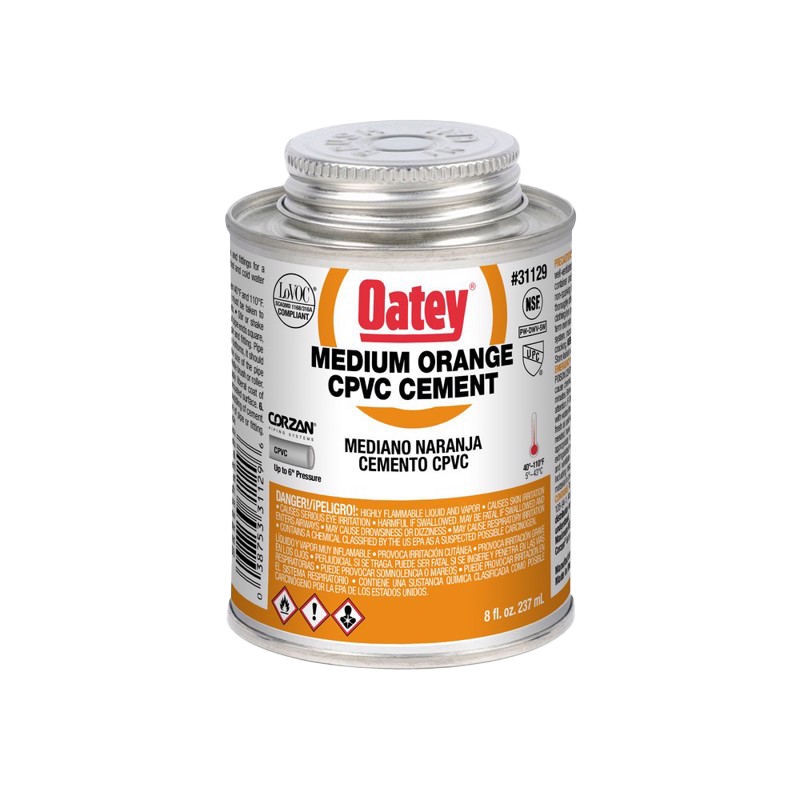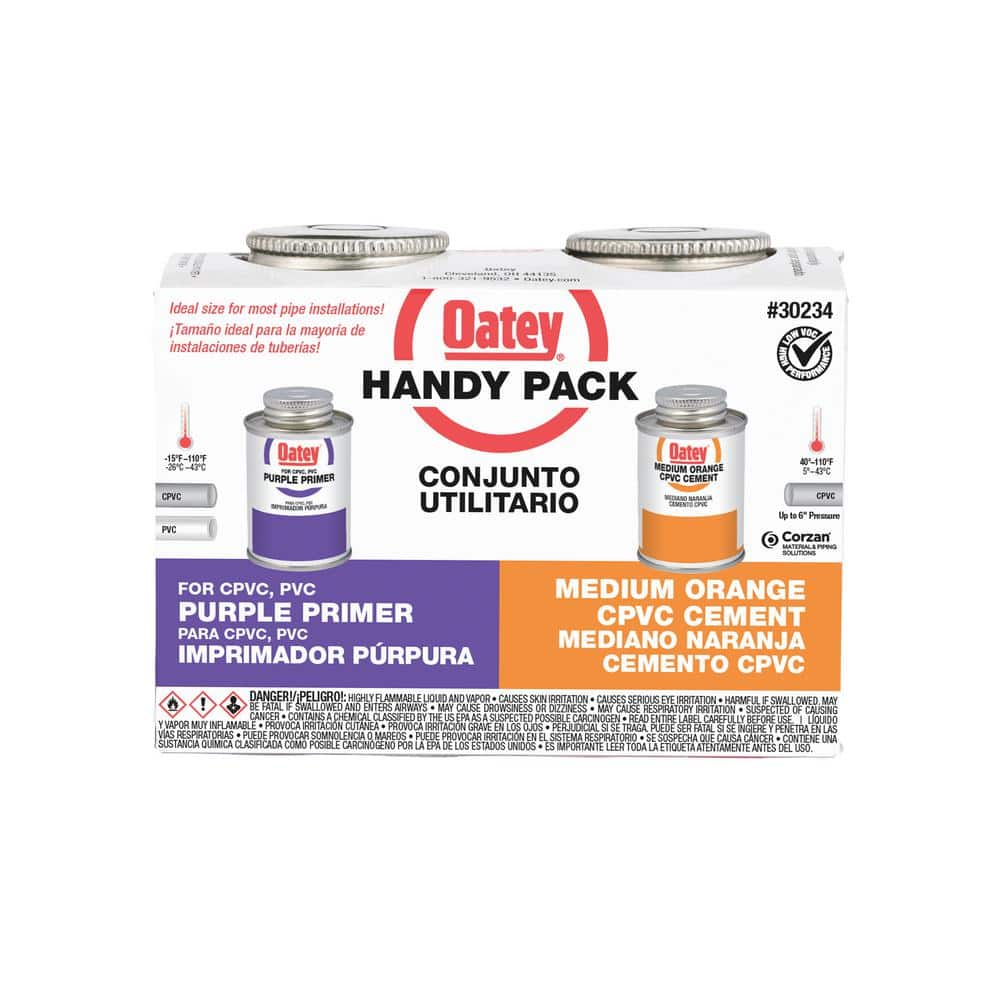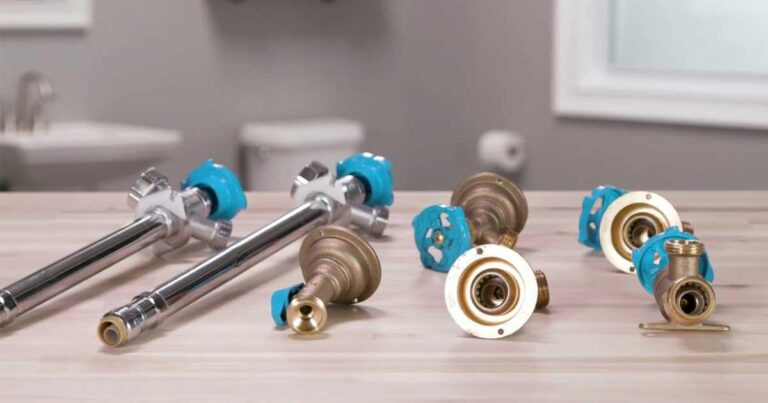Can You Use Cpvc Cement on Pvc: Essential Guide & Tips
No, you should not use CPVC cement on PVC pipes. CPVC cement is designed for CPVC materials and may not create a strong bond with PVC.
When working with plumbing or construction projects, knowing which materials to use is crucial. Using the wrong cement can lead to weak joints and potential leaks. PVC and CPVC are both common types of plastic pipes but have different properties and uses.
Understanding the differences between CPVC and PVC, and why their specific cements are important, will help you make the right choice for your project. We will explain the reasons behind this and guide you on the correct materials to ensure a safe and durable result.
Introduction To Cpvc And Pvc
Polyvinyl Chloride (PVC) and Chlorinated Polyvinyl Chloride (CPVC) are popular materials in plumbing. Both are types of plastic pipes used for various purposes. Each has unique properties and applications. Understanding these differences is important for proper usage.
Differences Between Cpvc And Pvc
CPVC can handle higher temperatures compared to PVC. CPVC pipes work well with hot water. PVC pipes are suitable for cold water only. CPVC has more chlorine content than PVC. This makes CPVC more resistant to corrosion. PVC is more rigid and less flexible. CPVC is slightly more flexible than PVC.
Common Uses Of Cpvc And Pvc
CPVC is often used in residential hot water systems. It is also used in industrial liquid handling. PVC is widely used in irrigation systems. It is also common in vent systems and waste management.
Both CPVC and PVC have their unique roles. Choosing the right one depends on your needs. Always check the material specifications before making a decision.

Credit: www.oatey.com
What Is Cpvc Cement?
CPVC cement is used to join CPVC pipes and fittings. But, using CPVC cement on PVC pipes is not recommended. It may not create a strong bond, leading to potential leaks.
CPVC cement is a special adhesive. It bonds CPVC pipes and fittings. CPVC stands for chlorinated polyvinyl chloride. This material is used in plumbing systems. CPVC cement creates strong, leak-proof joints. It is essential for safe water transport.Composition Of Cpvc Cement
CPVC cement contains solvents and resins. These chemicals soften the pipe surface. This allows the pipes to fuse together. The cement has a thick, syrup-like texture. It dries quickly, forming a hard, durable bond. The formula is designed for CPVC material only.Applications Of Cpvc Cement
CPVC cement is used in hot and cold water systems. It is ideal for residential and commercial plumbing. The cement is also used in industrial piping. It is suitable for water, chemicals, and other fluids. CPVC cement ensures reliable, long-lasting connections. “`What Is Pvc Cement?
If you have ever tackled a plumbing project, you might have heard about PVC cement. But what exactly is it? PVC cement is a type of adhesive that is used to join PVC pipes and fittings together. It creates a chemical bond that ensures the pipes stay connected and do not leak. Let’s dive deeper into what makes this adhesive so special and why it’s essential for your plumbing needs.
Composition Of Pvc Cement
So, what goes into making PVC cement? It’s a blend of various chemicals that work together to create a strong bond. The main ingredients include:
- Solvents: These are chemicals that dissolve the surface of the PVC pipe, allowing the cement to penetrate and create a seamless bond.
- Resins: These are the binding agents that help form the strong adhesive once the solvents have done their job.
- Fillers and Stabilizers: These ingredients help to improve the cement’s performance and durability.
When you apply PVC cement, the solvents soften the surface of the PVC pipes. Then, the resins create a strong, durable bond as the cement dries and hardens. This is what makes PVC cement so effective at preventing leaks and keeping pipes securely connected.
Applications Of Pvc Cement
Now that you know what PVC cement is made of, let’s explore its applications. PVC cement is used in a variety of settings, including:
- Residential Plumbing: Homeowners often use PVC cement to connect pipes in their bathrooms, kitchens, and laundry rooms.
- Commercial Plumbing: Businesses also rely on PVC cement for their plumbing needs, from restrooms to industrial water systems.
- Irrigation Systems: Gardeners and farmers use PVC cement to build and maintain irrigation systems that keep their plants and crops healthy.
- Aquariums and Pools: PVC cement is also used to construct and repair aquariums and swimming pools, ensuring that water stays where it belongs.
As you can see, PVC cement is a versatile and essential tool for anyone working with PVC pipes. It provides a reliable solution for connecting pipes and preventing leaks, making it a must-have for both DIY enthusiasts and professional plumbers.
So, the next time you embark on a plumbing project, you’ll know exactly what PVC cement is and why it’s so important. Happy plumbing!

Credit: www.reddit.com
Compatibility Of Cpvc Cement On Pvc
Understanding the compatibility of CPVC cement on PVC is crucial. Many people face this question when working on plumbing projects. CPVC and PVC are different materials, and their adhesives also differ. Using the wrong cement can lead to failures. This section will explore whether CPVC cement can be used on PVC pipes.
Chemical Reactions
CPVC cement and PVC have different chemical compositions. CPVC cement is made for CPVC material. It is designed to bond CPVC pipes using a specific chemical reaction. PVC pipes need PVC cement because of their unique chemical makeup. Mixing these can cause problems. CPVC cement may not create a strong bond with PVC.
Strength And Durability
The strength and durability of the bond are essential. PVC cement ensures a strong and durable bond for PVC pipes. Using CPVC cement on PVC might weaken the connection. This can lead to leaks and failures in the system. Always use the correct cement for each type of pipe to ensure long-lasting results.
Potential Risks
Using the right cement for your pipes is crucial for ensuring a secure and lasting connection. But what happens if you use CPVC cement on PVC pipes? While it might seem like a small detail, this choice can have significant implications. Let’s dive into the potential risks associated with this mistake.
Leaks And Failures
One of the most immediate risks of using CPVC cement on PVC pipes is the potential for leaks and failures. The chemical composition of CPVC cement is different from that of PVC cement. This difference can lead to weak joints that are prone to leaking. Imagine waking up to a flooded basement because of a tiny oversight! Not a pleasant start to the day, right?
Here’s a quick comparison to help you understand:
| CPVC Cement | PVC Cement |
|---|---|
| Designed for higher temperatures | Designed for cold and hot water applications |
| Stronger bonding for CPVC material | Optimal bonding for PVC material |
As you can see, each type of cement is tailored to its specific material. Mixing them up compromises the integrity of your plumbing system.
Health And Safety Concerns
But wait, there’s more! Using the wrong cement doesn’t just put your pipes at risk; it can also affect your health. CPVC cement often contains chemicals that are not intended for use with PVC. These chemicals can release harmful fumes or even contaminate your water supply.
- Fumes: Breathing in fumes from the wrong cement can cause respiratory issues.
- Water Contamination: Chemicals not designed for PVC can leach into your water, posing a risk if ingested.
Think about it: you wouldn’t use a hammer to drive a screw, right? The same principle applies here. Using the right tools and materials for the job is essential for safety and efficiency.
So, next time you’re tackling a plumbing project, double-check your materials. It’s a small step that can save you a lot of trouble down the line.

Credit: www.homedepot.com
Expert Recommendations
Choosing the right cement for your piping project is crucial. Using the wrong type of cement can lead to leaks and damage. Many people wonder if CPVC cement can be used on PVC pipes. Let’s look at what experts say.
Manufacturer Guidelines
Manufacturers provide clear instructions for their products. They generally do not recommend using CPVC cement on PVC pipes. Each type of cement has a specific formulation. CPVC cement is designed for CPVC materials. It has a higher temperature resistance. PVC cement, on the other hand, is made for PVC pipes. It ensures a proper bond and seal.
Always read the product label. Follow the guidelines provided by the manufacturer. This ensures the best performance and safety. Using the correct cement avoids potential issues in the future.
Professional Advice
Plumbing professionals advise against mixing cements. They stress the importance of using PVC cement for PVC pipes. Using the correct cement guarantees a strong and durable connection. It reduces the risk of leaks and failures.
Professionals also highlight the importance of proper preparation. Clean the pipes thoroughly before applying the cement. Make sure the surfaces are dry and free from dirt. This helps the cement bond better.
In summary, experts recommend using the right cement for your pipes. Stick to PVC cement for PVC pipes. This ensures a reliable and long-lasting installation.
Alternative Solutions
Have you ever been stuck in a situation where you’re out of PVC cement and all you have is CPVC cement? You’re not alone. While it’s tempting to use what’s on hand, there are better solutions that ensure your plumbing projects stay intact. Let’s dive into some alternative solutions to this common problem.
Using The Right Cement
First things first, using the correct type of cement is crucial. PVC and CPVC are two different materials with distinct chemical compositions. Using CPVC cement on PVC pipes can lead to weak joints and potential leaks. It’s like trying to use wood glue on metal – it just doesn’t work well.
So, what’s the best approach? Simple: use PVC cement for PVC pipes. It’s designed to create a strong bond that can withstand pressure and various temperatures. Here’s a quick table to help you identify the right cement:
| Type of Pipe | Recommended Cement |
|---|---|
| PVC | PVC Cement |
| CPVC | CPVC Cement |
As the saying goes, “Use the right tool for the job.” This applies to cement as well. It ensures your plumbing system remains durable and leak-free.
Adapting Different Materials
Sometimes, you might need to connect PVC to CPVC. Can it be done? Absolutely. But it requires a bit more care and the right products.
Here’s a step-by-step guide:
- Use a transition cement: There are special cements designed to bond PVC to CPVC. These are often labeled as “universal” or “multi-purpose” cements.
- Apply primer: Before you cement, use a primer. This prepares the surface and helps the cement bond better.
- Follow instructions: Always follow the manufacturer’s instructions for the best results. This includes proper drying times and application techniques.
Why go through this trouble? Because taking these extra steps ensures the integrity of your plumbing system. After all, nobody wants to deal with a burst pipe because of a weak joint.
In conclusion, while it might be tempting to use CPVC cement on PVC, it’s best to use the appropriate materials. Whether you’re sticking to PVC cement or adapting different materials, following these guidelines will save you time and headaches in the long run. Happy plumbing!
Practical Tips For Plumbing
Plumbing projects often require choosing the right materials and tools. One common question is whether you can use CPVC cement on PVC pipes. Here are some practical tips to help you achieve success in your plumbing tasks.
Proper Cement Application
Using the right cement is crucial for a strong bond. CPVC cement is different from PVC cement. Each type is formulated for its specific material. Using CPVC cement on PVC may not create a strong connection. Ensure you use the correct cement for your pipe material.
Clean the pipe and fittings before applying the cement. Dirt and debris can weaken the bond. Use a clean cloth to wipe the surfaces. Apply a primer to the pipe and fittings. This helps the cement bond better. Then, apply the cement evenly. Cover both the pipe and the fitting. Work quickly, as the cement sets fast.
Ensuring Secure Connections
Secure connections are key to a leak-free plumbing system. After applying the cement, insert the pipe into the fitting. Twist the pipe a quarter turn. This helps spread the cement evenly. Hold the pipe and fitting together for 30 seconds. This ensures the bond forms properly.
Check your connections after the cement has dried. Look for gaps or weak spots. Test your plumbing system for leaks. Turn on the water and observe the joints. Any leaks may indicate a weak bond. If needed, reapply the cement and test again.
Frequently Asked Questions
What’s The Difference Between Cpvc Glue And Pvc Glue?
CPVC glue is for CPVC pipes, tolerating higher temperatures. PVC glue is for PVC pipes, handling lower temperatures. Always use the correct glue type for each pipe to ensure proper bonding and safety.
Will Cpvc Glue Work On Pvc Reddit?
CPVC glue can work on PVC, but it’s not recommended. Use PVC cement for a stronger, more reliable bond.
Can I Use Oatey Regular Clear Pvc Cement On Cpvc?
No, Oatey regular clear PVC cement is not suitable for CPVC. Use CPVC-specific cement for proper bonding and safety.
What Is The Best Glue For Pvc Pipe Irrigation?
The best glue for PVC pipe irrigation is a solvent-based PVC cement. It ensures strong, watertight bonds. Brands like Oatey or Christy’s are highly recommended. Always use primer before applying cement for optimal results.
Conclusion
Using CPVC cement on PVC can lead to problems. Compatibility matters in plumbing. Always choose the right cement for each material. This ensures a strong, leak-proof bond. Ignoring this can result in weak joints and potential leaks. It’s important to read labels and follow guidelines.
Doing so saves time and future repairs. Proper use of materials guarantees a durable and reliable plumbing system. Stay informed and make smart choices for long-lasting results.

My name is Maria, A professional merge game player with years of experience mastering games like Merge Dragons, Merge Gardens, Merge Mansion, and more. My passion for uncovering the best strategies, solving tricky puzzles, and discovering hidden secrets led her to create MergeGameplay.com.






